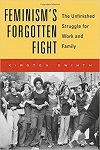Not Having It All | Social Sciences Reviews, December 2018
A fascinating, scholarly work that emphasizes how far we’ve come and how much more we can achieve in terms of gender equality; Westervelt’s refreshing take on feminist literature will inspire further exploration of both classic and current works
 Swinth, Kirsten. Feminism’s Forgotten Fight: The Unfinished Struggle for Work and Family. Harvard Univ. Nov. 2018. 307p. illus. index. ISBN 9780674986411. $35. HIST
Swinth, Kirsten. Feminism’s Forgotten Fight: The Unfinished Struggle for Work and Family. Harvard Univ. Nov. 2018. 307p. illus. index. ISBN 9780674986411. $35. HIST
Swinth (history, Fordham Univ.) examines the history and legacy of second-wave feminism in the 1960s and 1970s in the United States and the fight for women to “have it all” at home and at work. The author argues against the commonly held assumption that feminists did not achieve gains in regards to work and family and shows that women succeeded in changing expectations and mind-sets around these points. Several key battleground issues, such as the idea of gender roles that disconnect womanhood and motherhood as well as the myth of the male breadwinner and the equitable distribution and monetization of household work, give way to a discussion of universal childcare, pregnancy protections, and flexible work hours. For each area, Swinth examines strategies to advance policies in these areas, including legal challenges, advocacy, and legislation. Although many of these initiatives were not successful, their successes, failures, and limitations are all weighed. The author touches on the specific experiences of women of color but does not analyze the community’s concerns in depth.
VERDICT Overall, this is a fascinating, scholarly work that emphasizes how far we’ve come and how much more we can achieve in terms of gender equality.—Rebekah Kati, Univ. of North Carolina, Chapel Hill
 Westervelt, Amy. Forget “Having It All”: How America Messed Up Motherhood—and How To Fix It. Seal. Nov. 2018. 320p. notes. ISBN 9781580057868. $27; ebk. ISBN 9781580057882. SOC SCI
Westervelt, Amy. Forget “Having It All”: How America Messed Up Motherhood—and How To Fix It. Seal. Nov. 2018. 320p. notes. ISBN 9781580057868. $27; ebk. ISBN 9781580057882. SOC SCI
Reviewing the history of motherhood in the United States from the Puritans to now, award-winning journalist and podcaster Westervelt discusses how motherhood has changed in definition, often having a negative impact on mothers themselves. Touching not only on white motherhood, Westervelt relays how historical and current attitudes in sex education, eugenics, fertility, abortion, gender roles, corporate structures, and more also affect Latina, Native American, and African American motherhood experiences. Not only are her conclusions well documented with primary resources, she clearly lays out both cultural and policy fixes well worth debating. Although some changes may be perceived as radical, the true work will be in adjusting our ingrained cultural ideals that devalue caregiving and reinforce patriarchy. The author’s solutions are practical but challenging. Westervelt doesn’t abandon men; to the contrary, she stresses that we need to assist men in transitioning out of patriarchy before we can have a more equal society.
VERDICT Westervelt’s refreshing take on feminist literature will inspire further exploration of both classic and current works. Highly recommended for feminist collections and book clubs reading nonfiction.—Maria Bagshaw, Elgin Community Coll. Lib., IL
ALREADY A SUBSCRIBER? LOG IN
We are currently offering this content for free. Sign up now to activate your personal profile, where you can save articles for future viewing









Add Comment :-
Comment Policy:
Comment should not be empty !!!